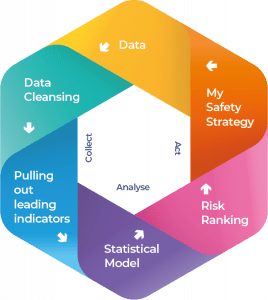Improving Safety Through Data

Andy Cross, Chief Operating Officer of HiLo
A former master mariner, Andy gave a fascinating explanation into how HiLo has broken the barriers of data sharing within the maritime industry. He asked:
- What is data?
- Why do we need it?
- What are we going to use it for?
Reactive or Proactive Approach – which is best?
Are the airline and medical industries proactive? Andy says not.
Something happens, an airline or medical disaster, and there is a reactive response to try and solve it. The industries put in immediate responses, investigate any data available, then try to work out both the root cause and potential solutions.
Andy noted that the maritime industry has always taken the same approach: looked at significant incidents that have occurred; then investigated them to try to work out the root causes. Sometimes this information is shared with the wider industry, to try and ensure it doesn’t happen again.
So why have these industries always been reactive and not proactive? Put simply: lack of resources and a huge amount of data to cope with, in a very fast-paced environment.
Andy suggested that mariners on the front line both ship-side and shore-side may lack the experience required, and that there are not enough of them to cope with the vast (and growing) amount of data.
In short, there is very limited time to review and act in order to prevent small issues growing out of control. This means significant incidents happen that could otherwise be prevented.
The Solution: Decision Support Systems
The solution, Andy stated, is a decision support system (DSS). This is the only way to draw useful conclusions from the data. Data mining serves no purpose if it does not ultimately help you make better decisions. As an example, he pointed out we all have a DSS in their pocket, in the form of a mobile phone, where each app helps you to make a life decision, from which route to drive to what to eat that day.
He summarised a DSS as a tool that:
- Separates insights from noise
- Compiles and analyses big data
- Helps human beings make objective decisions.
The maritime industry, Andy believes, has a lot of the data but isn’t yet clear how to use it.
A DSS should therefore separate all the noise:
Big data is vital – without a significant data set, you’re going to miss something.
The DSS has to help you, your seafarers, and your shore team to make objective decisions. Critically, it must allow them to be proactive: to make those decisions before something happens. And getting those decisions correct depends on access to full information.
A whole-industry mission
Critically, Andy states, you can’t do it alone. high-impact events are rare, so data relating them is limited. Any shipping company, no matter how large, has gaps in their data. The industry has to come together to collect the data and use it.
Decisions the HiLo Way
Andy demonstrated HiLo’s data journey [see figure 1 below].
- Currently [May 2022] HiLo has about half a million measurable data points from their customer base, from their vessels, relating to:
- Safety
- Audits and inspections
- Deficiencies or breakdowns
- However, there is a lot of ‘noise’ in this raw data, and it is of very little value in this state. The next stage therefore is to clean up the data.
- Once the data is cleansed, HiLo pull out the leading indicators (anything that can lead to a high impact event).
- Once these leading indicators are finalised, they are run through a statistical model which can produce an initial risk ranking of issues a vessel faces.
- This risk ranking is further refined by leading experts.
- Finally, HiLo provides their customers with an individual safety strategy based on this full analysis, with definite areas to concentrate on and precise actions to take.
Figure 1:

Breaking the barriers of data sharing
Breaking the barriers of data sharing
There are 5 key elements:
- Trust
- Large volume of data
- Quality reporting – the correct data for the correct output
- Remove the noise – unusable datapoints
- Actionable output
The most critical is trust.
Everyone in the industry has data. Nobody shares it. Nobody wants you to know what the person next to you has got; or why.
As an organisation, he stressed, you have to trust who you’re sharing your data with. You have to know where it’s going, what they’re going to use it for, what you’re going to get back. You’re not going to share anything if you’re not going to get anything in return.
It is therefore no surprise trust is the biggest issue Hilo have seen in the industry, because mariners fear charterers may get hold of information and blacklist their ships. However, he confirmed that the HiLo system is so securely constructed and anonymised that this would not be possible.
We are already sharing data
As Andy noted, information about everything we do in our lives is already out there in the open through our digital footprints.
Banks, shopping websites, all sorts of platforms use our personal data, whether we know it or not: every time you log on to a website or app and ‘accept cookies’. So why be scared of something that has already happened?
Huge thanks to Andy for demonstrating the vital need to break the barriers of data sharing within the maritime industry. We were delighted to have him on HiLo’s panel at the Posidonia conference: ‘Using Data and Analytics to Prevent Maritime Incidents’.
You can also read presentations from our other panellists:
- Using Data to Prevent Incidents, by George Kouloukas, Safety Manager at Gaslog Lng Services Ltd
- Loss Prevention, by Stuart Edmonston, UK P&I Loss Prevention Director
- Preventing Maritime Incidents Through Data and Analytics – a Lloyd’s Register Viewpoint, by Mark Warner, Director, Maritime Performance Services, Lloyd’s Register